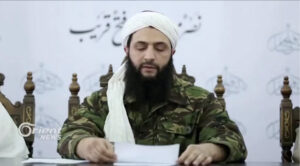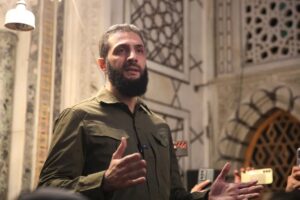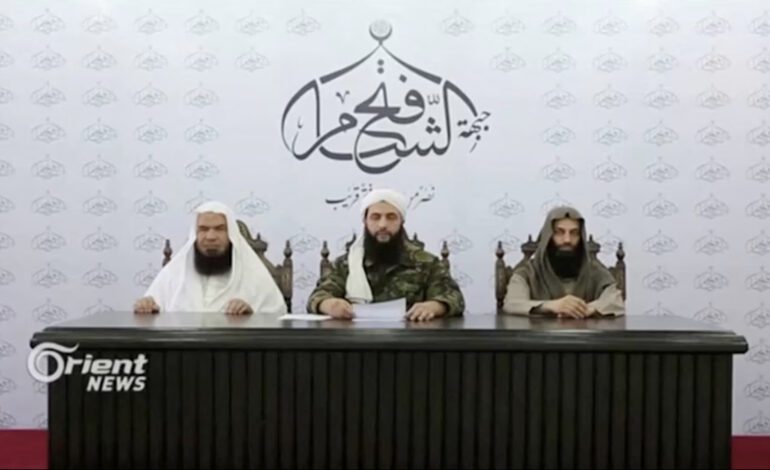As rebels entered Aleppo, pre-war Syria’s largest city, a video showed him in military fatigues issuing orders by phone, reminding fighters of directives to protect the people and forbidding them from entering homes.
On Wednesday he visited Aleppo’s citadel, accompanied by a fighter waving a Syrian “revolution flag” — once shunned by Nusra as a symbol of apostasy, but recently embraced by Golani, a nod to Syria’s more mainstream opposition, another video showed.
“Golani outsmarted Assad. He’s retooled, he’s refashioned, made new allies and come out with his charm offensive” towards minorities, said Joshua Landis, a Syria expert and head of the Center for Middle East Studies at the University of Oklahoma, according to Reuters.
Aron Lund, a fellow at the think-tank Century International, said Golani and HTS had clearly changed, while noting they remained “pretty hard-line.”

Then-Syrian Islamist rebel group Nusra Front leader Abu Mohammed al-Golani (Ahmad al-Sharaa) speaks at an unknown location in this still image from a 2016 file video obtained December 5. Orient TV/Reuters TV
“It’s PR, but the fact they are engaging in this effort at all shows they are no longer as rigid as they once were,” he said. “Old-school al Qaeda or ISIS would never have done that.”
Golani and the Nusra Front emerged as the most powerful of the multitude of rebel factions that sprang up in the early days of the insurgency against Assad more than a decade ago.
Before founding the Nusra Front, Golani had fought for al Qaeda in Iraq, where he spent five years in a U.S. prison. He returned to Syria once the uprising began, sent by the leader of the ISIS group in Iraq at the time — Abu Omar al-Baghdadi — to build up al Qaeda’s presence.
The United States designated Golani a terrorist in 2013, saying that al Qaeda in Iraq had tasked him with overthrowing Assad’s rule and establishing Islamic sharia law in Syria, and that Nusra had carried out suicide attacks that killed civilians and espoused a violent sectarian vision.
Turkey, the Syrian opposition’s main foreign backer, has designated HTS as a terrorist group, while supporting some of the other factions that fight in the northwest.
Golani gave his first media interview in 2013, his face wrapped in a dark scarf and showing only his back to the camera. Speaking to Al Jazeera, he called for Syria to be run according to sharia law.
Some eight years later, he sat down for an interview with the PBS Frontline program, facing the camera and wearing a shirt and jacket.
Golani said the terrorist designation was unfair and that he opposed the killing of innocent people.
He detailed how the Nusra Front had expanded from the six men who accompanied him from Iraq to 5,000 within a year.
But he said that his group had never presented a threat to the West.

Abu Mohammed al-Golani, now using his real name, Ahmad al-Sharaa, addresses a crowd in the Syrian capital’s landmark Umayyad Mosque on Sunday. – Photo by AFP
“I repeat — our involvement with al Qaeda has ended, and even when we were with al Qaeda we were against carrying out operations outside of Syria,” he said. “And it’s completely against our policy to carry out external action.”
He fought a bloody war against his old ally Baghdadi after ISIS sought to unilaterally subsume the Nusra Front in 2013. Despite its al Qaeda ties, Nusra was regarded as more tolerant and less heavy handed in its dealings with civilians and other rebel groups compared to ISIS.
ISIS was subsequently beaten out of territory it held in both Syria and Iraq by an array of adversaries, including a U.S.-led military alliance.
As ISIS was collapsing, Golani was cementing the grip of HTS in the northwestern Syrian province of Idlib, establishing a civil administration called the Salvation Government.
The Assad government views HTS as terrorists, along with the rest of the rebels who rose up against Damascus.
With the Sunni Muslim rebels now on the march, the HTS administration has issued several statements seeking to assure the Shi’a Alawites and other Syrian minorities. One statement urged the Alawites to break away from Assad’s government and be a part of a future Syria that “does not recognize sectarianism.”
In a message to residents of a Christian town south of Aleppo on Wednesday, Golani said they would be protected and their property safeguarded, urging them to remain in their homes and to reject the Syrian government’s “psychological warfare.”
“He’s really important,” Lund said. “The main rebel leader in Syria, the most powerful Islamist.”
He said HTS had displayed “logistical and governance capacity” by ruling its own territory in Idlib for years.
“They have adopted the symbols of the wider Syrian uprising…, which they now use and try to claim the revolutionary legacy — that ‘we are part of the movement of 2011, the people who rose up against Assad, and we are also Islamists.’”
–Reuters wire service. Edited for style.






Leave a Reply